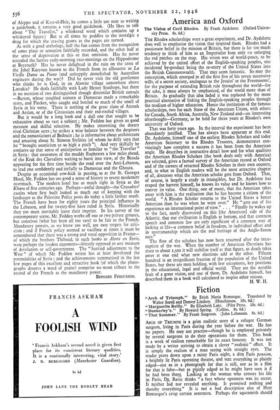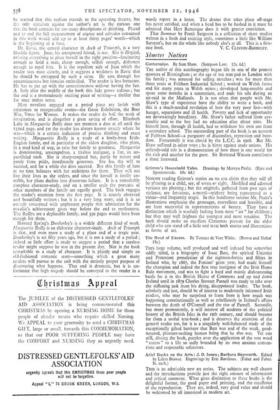Fiction
" Arch of Triumph." By Erich Maria Remarque. Translated by Walter Sorel and Denver Lindsey. (Hutchinson. 10s. 6d.) " Marguerite Reilly." By Elizabeth Lake. (Pilot Press. 10s. 6d.)
" Dunkerley's." By Howard Spring. (Collins. 8s. 6d.)
" That Summer." By Frank Sargeson. (John Lehmann. 8s. 6d.)
ARCH OF TRIUMPH is a grim realistic story of a refugee German surgeon, living in Paris during the year before the war. He has no papers. He may not practise—though he is employed privately by several surgeons to do their operations for them. This book is a work of realism remarkable for its exact honesty. It was not made by a writer striving to obtain a clever " realistic " effect. It is simply the realism of a man seeing with straight eyes. The reader peers down upon a misty Paris night, a dim Paris pension, a brightly lit Paris operating theatre, and sees everything as plainly edged—not as in a photograph for that is still, nor as in a film for that is false—but as plainly edged as he might have seen it if he had been therc. Long at the woman who crosses his life in Paris, Dr. Ravic thinks " a face whose openness was its secret. It neither hid nor revealed anything. It promised nothing and thereby everything." It is not a bad description also of Herr Remarque's crisp certain sentences. Perhaps the squeamish should be warned that this realism extends to the operating theatre, but the only criticism against the author's art is the curious one that the book contains far too many descriptions of drinking. Placed end to end the full measurement of cognac and calvados consumed in this work would add up to at least thirty pages' worth—which is the beginning of a bore.
Dr. Ravic, the central character in Arch of Triumph, is a very likeable figure. Joan, his unexpected friend, is not. She is illogical, twisting everything to place herself in the right position—fascinating enough to hold a man, cheap enough, selfish enough, dishonest enough to repel him. It is the repellant side of Joan which the reader sees most clearly, and it suggests a weakness in Ravic that he should be entrapped by such a siren. He sees through her sententiousness but remains enthralled. The reader is less fortunate. He has to put up with the sententiousness without having the fun. A- little after the middle of the book this lady grows tedious ; but the end is a tremendously exciting piece of writing—a thriller that for once makes sense.
Most novelists engaged on a period piece are lavish with references to recognisable events—the Great Exhibition, the Boer War, Votes for Women. It makes the reader do half the work of imagination, and is altogether a great saving of effort. Elizabeth Lake in Marguerite Reilly does not mention a date at all until the 152nd page, and yet the reader has always known exactly where he was—which is a certain indication of precise thinking and exact writing. Margueritie Reilly is a study of a lowly-born Irish- English family, and in particular of the eldest daughter, who plans, in a mad kind of way, to raise her family to greatness. Marguerite is domineering, unscrupulous, a tireless intriguer, a liar, an un- paralleled snob. She is sharp-tongued but, partly by nature and partly from pride, inordinately generous. She has the will to succeed, and for a while she does succeed. But this family of hers at no time balances with her ambitions for them. They will not live their lives as she orders, and since she herself is totally un- stable, her plans decline into disastrous failure. It is a remarkably complete character-study, and on a smaller scale the portraits of other members of the family are equally good. The book engages the reader's attention from the first page. It is acutely observed and beautifully written ; but it is a very long story, and it is so entirely concerned with unpleasant people that admiration for the novelist's achievement gives way before the end to restlessness. The Reillys are a deplorable family, and 35o pages would have been enough for them.
Howard Spring's Dunkerley's is a widely different kind of work. Marguerite Reilly is an elaborate character-study. Arch of Triumph is that, and even more a study of a place and of a tragic year. Dunkerley's is set fifty years ago, but it is not a study of a period ; indeed so little effort is made to suggest a period that a careless reader might suppose he was in the present day. Nor is the book remarkable as a study of character. It is plainly and simply an old-fashioned romantic story—something which a great many readers will pursue to the end with the entirely proper purpose of discovering what happens. That end is dramatic, but it is un- fortunate that high tragedy should be conveyed to the reader in a
wordy report in a letter. The drama that takes place off-stage has never satisfied, and when a head has to be bashed in it must be admitted that Herr Remarque does it with greater conviction.
That Summer by Frank Sargeson is a collection of short studies written in a fresh and exciting style, sometimes a little like William Saroyan's, but on the whole like nobody else's at all. This is a first-



































 Previous page
Previous page